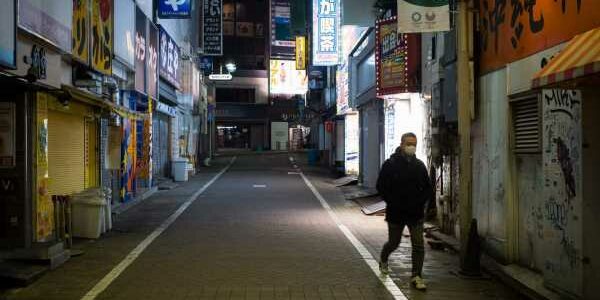
Japan Considers Extension of Covid Emergency as Economy Sputters
Japanese Prime Minister Yoshihide Suga looks set to extend a state of emergency this week for major metropolitan areas that will inflict more pain on the economy as he tries to contain the current wave of Covid-19 and turn around a sharp fall in public support in an election year.
The emergency covering 11 areas including Tokyo, Osaka and Nagoya has helped halt a rapid acceleration of virus cases. But it still looks a ways off from returning infection rates to the levels of December.
Suga is looking to extend the emergency by about one month beyond its Feb. 7 deadline and the possible removal of Tochigi prefecture from the list as the situation on the ground improves there, according to local media reports.
While the advisories curtailing activity after 8 p.m. and calling for people to work from home are less stringent and enforceable than the lockdowns of some European nations, they have already caused a sea change in the view of economists. Instead of the year starting with a slowing recovery, they now see another contraction looming.
The prime minister has already faced criticism from those who say he acted too slowly to suspend a travel campaign that could have contributed to a spread of infections. He must now judge if it is necessary to extend the distress of businesses after his emergency measures struggled to provide the short, sharp shock needed to put a lid on the Covid upsurge, shore up his leadership and keep alive the hope of holding the Olympic Games in summer.
“The damage to businesses would be enormous,” said sushi restaurant owner Mamoru Sugiyama, referring to an extension. Bars and eateries are among the firms hardest hit by the guidelines. He has temporarily closed his restaurant, which boasts a history of 130 years in the swanky Tokyo shopping district of Ginza.
“Some businesses are about to use up their loans and I think if the emergency continues through February, firms may start going bust one after another, even in Ginza,” said Sugiyama, who also heads a coalition of about 370 local restaurants and bars.
Japan to Know Soon If Emergency Virus Measures Are Working
The government has said the emergency can end when the virus crisis eases to Stage 3 on a four-stage scale that draws on six data points.
In Tokyo, that would mean daily infections falling below 500. Tokyo reported 633 new infections on Sunday, well below the recent peak of 2,447 on Jan. 7. As of Jan. 27, the capital’s bed occupancy rate was 73% and those taken by the critically ill was at 113% of capacity, according to the health ministry. Both numbers would have to come down below 50% to improve to Stage 3.
“We can see that the state of emergency has had an impact, but it’s been too weak,” said Yoshihito Niki, a professor of clinical infectious diseases at Showa University’s School of Medicine in Tokyo, indicating a need to prolong the measures. “The government will need to exercise patience at least through February.”
While the situation in Tokyo looks unlikely to deliver the metrics needed to avoid an extension, Suga could opt to remove the emergency state or scale back the advisories in some of the other prefectures that are faring better.
Lawmakers are also debating whether to give more teeth to the measures that do remain in place. Some restaurants and bars — the sector worst hit by the measures — have defied the call to close at 8 p.m. and could face fines under the proposals. The powerful lower house of parliament could vote as early as Monday on whether to add penalties.
From the declaration of the emergency in early January, economists warned that the less stringent advisories compared with the first emergency in April, risked being insufficient and causing more damage over time. This time, schools remained open and streets continued to see foot traffic, albeit smaller than during normal times, despite repeated calls from officials to stay home.
Still, an unemployment rate of just 2.9% and year-on-year falls in the number of bankruptcies show that spending and loan support from the government and the Bank of Japan have helped cushion the economic blow of the pandemic so far. Suga’s administration got a third extra budget through parliament last week offering another round of help for businesses, medical facilities and the economy.
The concern going ahead is how much longer companies can hang on if the emergency is extended and consumer spending remains subdued.
Yasuhide Yajima, chief economist at NLI Research Institute, warns that there won’t be a dramatic revival of growth even when the emergency ends unless there’s more concrete reassurance for the public.
“Regardless of the state of emergency, consumption isn’t going to come back until we see the impact of vaccination,” Yajima said.
— With assistance by Emi Nobuhiro, and Gearoid Reidy
Source: Read Full Article